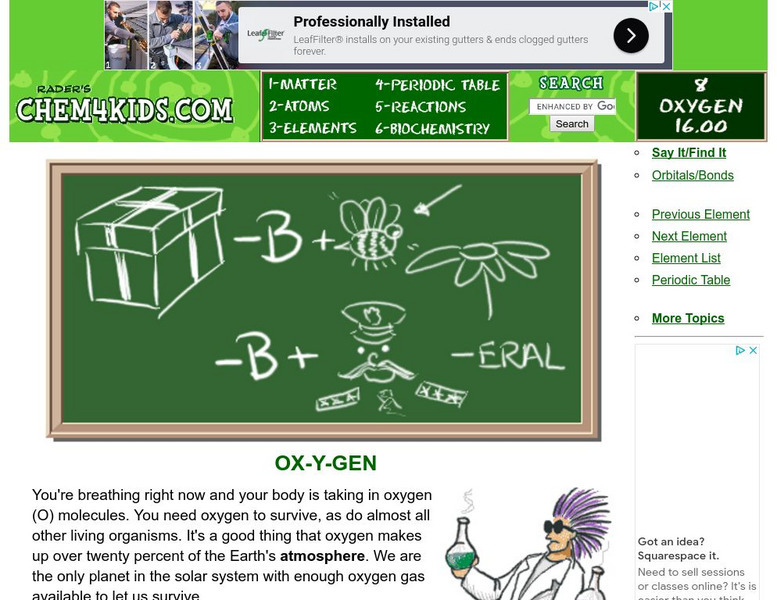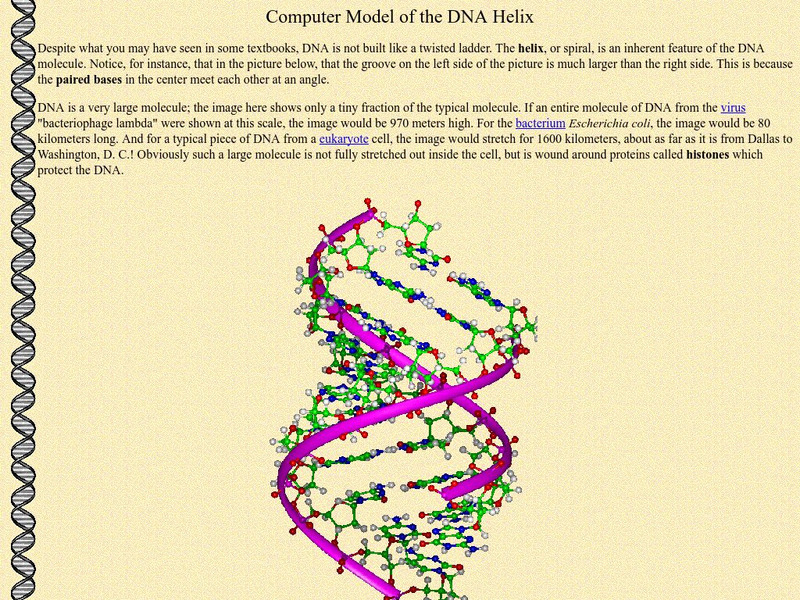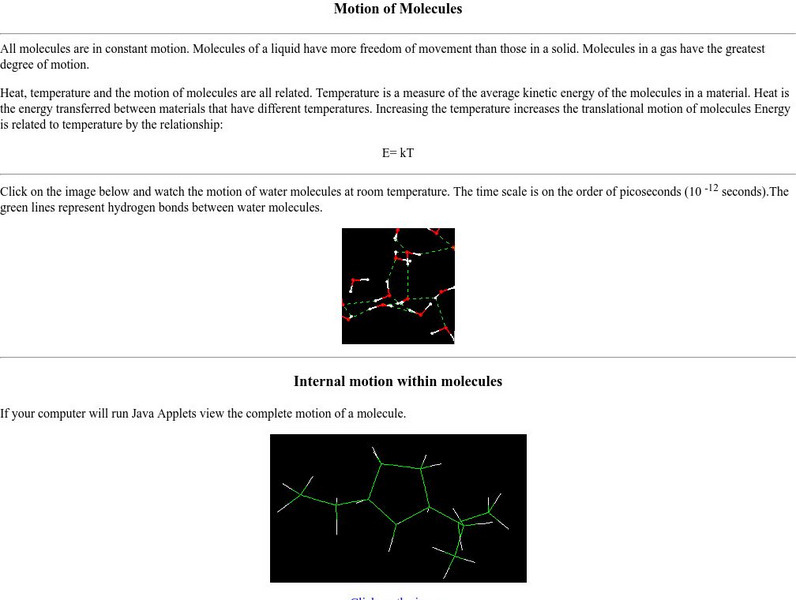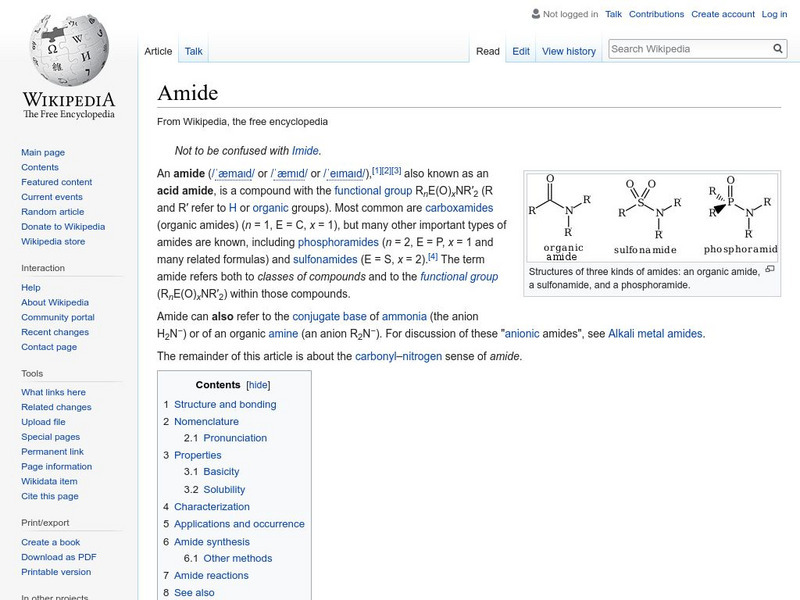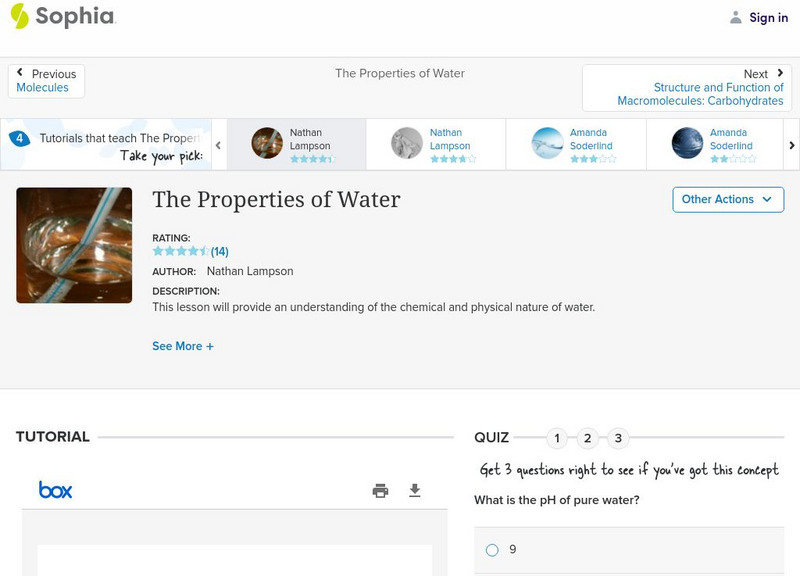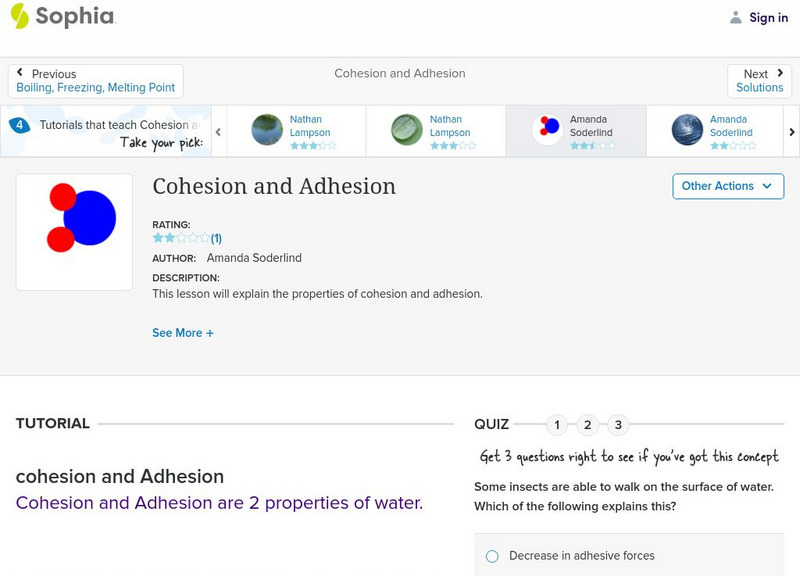Hi, what do you want to do?
CK-12 Foundation
Ck 12: Properties of Water
[Free Registration/Login may be required to access all resource tools.] Students look at the chemical structure of water and learn how it determines water's properties.
CK-12 Foundation
Ck 12: Biology: Water and Life
[Free Registration/Login may be required to access all resource tools.] Covers the structure and properties of water.
Nobel Media AB
The Nobel Prize: Robert Hofstadter Biographical
Official Nobel Institute biography of Hofstadter. Very little personal information. Lots and lots of science work, description, etc.
CK-12 Foundation
Ck 12: Biology: Water and Life
[Free Registration/Login may be required to access all resource tools.] Covers the structure and properties of water.
CK-12 Foundation
Ck 12: Chemistry Simulation: Dripping Droplets
[Free Registration/Login Required] Explore intermolecular forces by seeing how many drops of a liquid a penny can hold.
Chem4kids
Chem4 Kids: Oxygen (O)
Here you can find some great information about the 8th element in the periodic table, "oxygen." Content focuses on oxygen's electrons, where you can find oxygen in nature and in the home, and how oxygen combines with other elements.
University of California
Ucmp: Computer Model of Dna
A slight departure from the classic view of DNA showing that the molecule is not exactly a twisted ladder. Good image and explanation to go with it.
Curated OER
Simon Fraser University: Molecules and the Properties of Bonded Atoms
Drawing of a caffeine molecule. Hydrogen = white; Carbon = blue; Oxygen = red
Royal Society of Chemistry
Kitchen Chemistry: The Structure of Ice and Water [Pdf]
A set of questions about the molecular structure of water and of ice.
New York University
Nyu: Math Mol: Motion of Molecules
Examine the link between molecular motion and energy. Observe the movement of a molecule at room temperature. Learn about the different types of molecular motion.
Wikimedia
Wikipedia: Amide
Wikipedia entry for the chemical compound amide. Includes naming conventions, properties, reactions, and so on.
Sophia Learning
Sophia: The Properties of Water: Lesson 3
This lesson will provide an understanding of the chemical and physical nature of water. It is 3 of 4 in the series titled "The Properties of Water."
Sophia Learning
Sophia: The Properties of Water: Lesson 4
This lesson will provide an understanding of the chemical and physical nature of water. It is 4 of 4 in the series titled "The Properties of Water."
Sophia Learning
Sophia: The Properties of Water: Lesson 1
This lesson will provide an understanding of the chemical and physical nature of water. It is 1 of 4 in the series titled "The Properties of Water."
OpenStax
Open Stax: Organic Compounds Essential to Human Functioning
Learn here about organic compounds, groups of carbon atoms covalently bonded to hydrogen, usually oxygen, and often other elements as well, and how they are essential to human functioning.
Concord Consortium
Concord Consortium: Nonbonding
Bring two molecules together and observe potential energy changes.
Sophia Learning
Sophia: Tertiary Structure of Proteins: Lesson 1
This lesson will explain the tertiary structure of a protein. It is 1 of 2 in the series titled "Tertiary Structure of Proteins."
Sophia Learning
Sophia: Tertiary Structure of Proteins: Lesson 2
This lesson will explain the tertiary structure of a protein. It is 2 of 2 in the series titled "Tertiary Structure of Proteins."
Sophia Learning
Sophia: Secondary Structure of Proteins
This lesson will explain the secondary structure of a protein.
Sophia Learning
Sophia: Cohesion and Adhesion: Lesson 2
This lesson will explain the properties of cohesion and adhesion. It is 2 of 4 in the series titled "Cohesion and Adhesion."
Sophia Learning
Sophia: Biology: Macromolecules: Secondary Structures of Proteins
This lesson will explain the secondary structure of a protein.
Sophia Learning
Sophia: Cohesion and Adhesion: Lesson 3
This lesson will explain the properties of cohesion and adhesion. It is 3 of 4 in the series titled "Cohesion and Adhesion."
Chem4kids
Chem4 Kids: Sulfur (S)
Here you can find some great information about the 16th element in the periodic table, "sulfur." Content focuses on sulfur's electrons, where you can find sulfur in nature and in the home, and how sulfur combines with other elements.
Chem4kids
Chem4 Kids: Alkali Metals to the Left
To the left. To the left. The elements in the left column of the period table are alkali metals with the exception of hydrogen. This is a brief overview of the alkali metals, what their family is all about and how well they bond or do...










